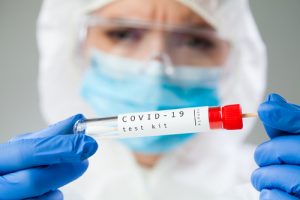
The Department of Defense (DOD) must immediately make plans to utilize the latest rapid antigen tests for coronavirus to detect the asymptomatic carriers of the virus among military personnel, their families, civilian employees, and contractors in order to save lives, preserve hospital capacity, and maintain military readiness, according to U.S. Sens. Thom Tillis (R-NC) and Joni Ernst (R-IA).
In a Nov. 19 letter the lawmakers sent to Under Secretary of Defense, Personnel and Readiness Matthew Donovan, they highlighted the challenges associated with detecting coronavirus based largely on symptoms.
For instance, a recent study of over 1,800 U.S. Marine Corps recruits published by the New England Journal of Medicine showed that more than 90 percent of the individuals who tested positive for coronavirus in the study were not symptomatic, according to their letter.
“This study utilized the molecular PCR test for its analysis,” wrote Sens. Tillis and Ernst, who serve on the U.S. Senate Armed Services Committee. “However, the U.S. military does not have the time, resources or capacity to utilize PCR testing for its entire population of service members, family members, civilians, and contractors.”
PCR tests and antigen tests are both diagnostic tests that are used to determine an active coronavirus infection, according to Harvard Medical School in a Nov. 20 blog. The difference is that it can take days to over a week to get the PCR results, while it can take less than an hour to get the results from an antigen test. And while positive antigen test results are highly specific, there is a higher chance of false negatives. “If you have a negative result on an antigen test, your doctor may order a PCR test to confirm the result,” according to the blog.
While the senators noted in their letter that rapid antigen testing must be followed up with a PCR test, they also pointed out “the extremely lower cost of an antigen test compared to a PCR test.”
“The Department of Defense already has the resources to conduct multiple antigen tests over a two-week or four-week period, similar to the U.S. Marine Corps study, to help reduce the chance of a false-negative test result,” the senators wrote. “We look forward to working with you to find solutions and maintain the readiness of our military force.”



